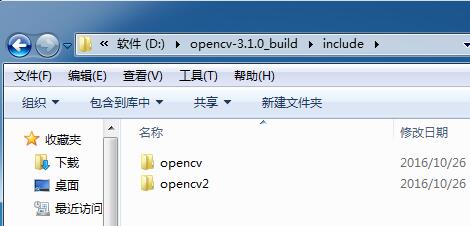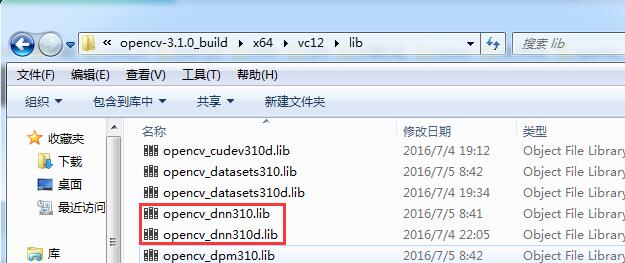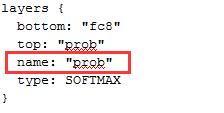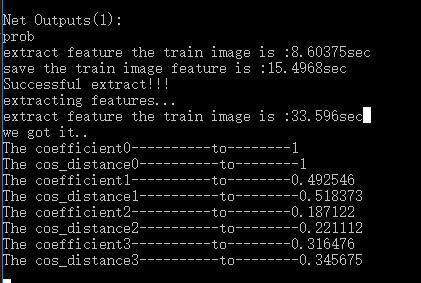随着深度学习的发展,opencv3.1也可以直接调用caffe或者torch。下面是使用opencv的dnn模块来进行人脸识别:
1:编译opencv3.1
首先下载opencv源码https://github.com/opencv/opencv
下载Cmake https://cmake.org/download/
下载opencv的
具体的camke过程可以参考这篇博客:
http://www.cnblogs.com/jliangqiu2016/p/5597501.html
编译完成后可以把不需要的文件删除仅保留include bin lib 文件即可。


编译好的opencv3.1和普通opencv的配置过程一样:
opencv_aruco310.lib
opencv_bgsegm310.lib
opencv_bioinspired310.lib
opencv_calib3d310.lib
opencv_ccalib310.lib
opencv_core310.lib
opencv_cudaarithm310.lib
opencv_cudabgsegm310.lib
opencv_cudacodec310.lib
opencv_cudafeatures2d310.lib
opencv_cudafilters310.lib
opencv_cudaimgproc310.lib
opencv_cudalegacy310.lib
opencv_cudaobjdetect310.lib
opencv_cudaoptflow310.lib
opencv_cudastereo310.lib
opencv_cudawarping310.lib
opencv_cudev310.lib
opencv_datasets310.lib
opencv_dnn310.lib
opencv_dpm310.lib
opencv_face310.lib
opencv_features2d310.lib
opencv_flann310.lib
opencv_fuzzy310.lib
opencv_highgui310.lib
opencv_imgcodecs310.lib
opencv_imgproc310.lib
opencv_line_descriptor310.lib
opencv_ml310.lib
opencv_objdetect310.lib
opencv_optflow310.lib
opencv_photo310.lib
opencv_plot310.lib
opencv_reg310.lib
opencv_rgbd310.lib
opencv_saliency310.lib
opencv_shape310.lib
opencv_stereo310.lib
opencv_stitching310.lib
opencv_structured_light310.lib
opencv_superres310.lib
opencv_surface_matching310.lib
opencv_text310.lib
opencv_tracking310.lib
opencv_ts310.lib
opencv_video310.lib
opencv_videoio310.lib
opencv_videostab310.lib
opencv_viz310.lib
opencv_xfeatures2d310.lib
opencv_ximgproc310.lib
opencv_xobjdetect310.lib
opencv_xphoto310.lib
在opencv的源码中提供了dnn的test.cpp
下面具体分析代码:
/* Find best class for the blob (i. e. class with maximal probability) */
获取prob层的输出:实际意义为测试图片所对应与标签的概率值。resize成一个列向量,然后排序,输出最大值和最大值所对应的位置。
void getMaxClass(dnn::Blob &probBlob, int *classId, double *classProb)
{
Mat probMat = probBlob.matRefConst().reshape(1, 1); //reshape the blob to 1x1000 matrix
Point classNumber;
minMaxLoc(probMat, NULL, classProb, NULL, &classNumber);
*classId = classNumber.x;
}相关系数函数:一种相似性度量用于判断两个人的相似性距离。
float mean(const std::vector<float>& v)
{
assert(v.size() != 0);
float ret = 0.0;
for (std::vector<float>::size_type i = 0; i != v.size(); ++i)
{
ret += v[i];
}
return ret / v.size();
}
float cov(const std::vector<float>& v1, const std::vector<float>& v2)
{
assert(v1.size() == v2.size() && v1.size() > 1);
float ret = 0.0;
float v1a = mean(v1), v2a = mean(v2);
for (std::vector<float>::size_type i = 0; i != v1.size(); ++i)
{
ret += (v1[i] - v1a) * (v2[i] - v2a);
}
return ret / (v1.size() - 1);
}
// 相关系数
float coefficient(const std::vector<float>& v1, const std::vector<float>& v2)
{
assert(v1.size() == v2.size());
return cov(v1, v2) / sqrt(cov(v1, v1) * cov(v2, v2));
}cos相似性距离函数:
//cos 相似性度量
float cos_distance(const std::vector<float>& vecfeature1, vector<float>& vecfeature2)
{
float cos_dis=0;
float dotmal=0, norm1=0, norm2=0;
for (int i = 0; i < vecfeature1.size(); i++)
{
dotmal += vecfeature1[i] * vecfeature2[i];
norm1 += vecfeature1[i] * vecfeature1[i];
norm2 += vecfeature2[i] * vecfeature2[i];
}
norm1 = sqrt(norm1);
norm2 = sqrt(norm2);
cos_dis = dotmal / (norm1*norm2);
return cos_dis;
}下面是主函数:
/**/
//
//
#include <opencv2/dnn.hpp>
#include <opencv2/imgproc.hpp>
#include <opencv2/highgui.hpp>
using namespace cv;
using namespace cv::dnn;
#include <fstream>
#include <iostream>
#include <cstdlib>
#include <time.h>
#include<math.h>
using namespace std;
/* Find best class for the blob (i. e. class with maximal probability) */
void getMaxClass(dnn::Blob &probBlob, int *classId, double *classProb)
{
Mat probMat = probBlob.matRefConst().reshape(1, 1); //reshape the blob to 1x1000 matrix
Point classNumber;
minMaxLoc(probMat, NULL, classProb, NULL, &classNumber);
*classId = classNumber.x;
}
std::vector<String> readClassNames(const char *filename = "synset_words.txt")
{
std::vector<String> classNames;
std::ifstream fp(filename);
if (!fp.is_open())
{
std::cerr << "File with classes labels not found: " << filename << std::endl;
exit(-1);
}
std::string name;
while (!fp.eof())
{
std::getline(fp, name);
if (name.length())
classNames.push_back(name.substr(name.find(' ') + 1));
}
fp.close();
return classNames;
}
string Int_String(int a)
{
std::stringstream ss;
std::string str;
ss << a;
ss >> str;
return str;
}
float mean(const std::vector<float>& v)
{
assert(v.size() != 0);
float ret = 0.0;
for (std::vector<float>::size_type i = 0; i != v.size(); ++i)
{
ret += v[i];
}
return ret / v.size();
}
float cov(const std::vector<float>& v1, const std::vector<float>& v2)
{
assert(v1.size() == v2.size() && v1.size() > 1);
float ret = 0.0;
float v1a = mean(v1), v2a = mean(v2);
for (std::vector<float>::size_type i = 0; i != v1.size(); ++i)
{
ret += (v1[i] - v1a) * (v2[i] - v2a);
}
return ret / (v1.size() - 1);
}
// 相关系数
float coefficient(const std::vector<float>& v1, const std::vector<float>& v2)
{
assert(v1.size() == v2.size());
return cov(v1, v2) / sqrt(cov(v1, v1) * cov(v2, v2));
}
//cos 相似性度量
float cos_distance(const std::vector<float>& vecfeature1, vector<float>& vecfeature2)
{
float cos_dis=0;
float dotmal=0, norm1=0, norm2=0;
for (int i = 0; i < vecfeature1.size(); i++)
{
dotmal += vecfeature1[i] * vecfeature2[i];
norm1 += vecfeature1[i] * vecfeature1[i];
norm2 += vecfeature2[i] * vecfeature2[i];
}
norm1 = sqrt(norm1);
norm2 = sqrt(norm2);
cos_dis = dotmal / (norm1*norm2);
return cos_dis;
}
int main()
{
String modelTxt = "VGG_FACE_deploy.prototxt";
String modelBin = "VGG_FACE.caffemodel";
//String imageFile = (argc > 1) ? argv[1] : "ak.png";
/*String modelTxt = "bvlc_googlenet.prototxt";
String modelBin = "bvlc_googlenet.caffemodel";
String imageFile = (argc > 1) ? argv[1] : "1.jpg";*/
//! [Create the importer of Caffe model]
Ptr<dnn::Importer> importer;
try //Try to import Caffe GoogleNet model
{
importer = dnn::createCaffeImporter(modelTxt, modelBin);
}
catch (const cv::Exception &err) //Importer can throw errors, we will catch them
{
std::cerr << err.msg << std::endl;
}
//! [Create the importer of Caffe model]
if (!importer)
{
std::cerr << "Can't load network by using the following files: " << std::endl;
std::cerr << "prototxt: " << modelTxt << std::endl;
std::cerr << "caffemodel: " << modelBin << std::endl;
std::cerr << "bvlc_googlenet.caffemodel can be downloaded here:" << std::endl;
std::cerr << "http://dl.caffe.berkeleyvision.org/bvlc_googlenet.caffemodel" << std::endl;
exit(-1);
}
//! [Initialize network]
dnn::Net net;
importer->populateNet(net);
importer.release(); //We don't need importer anymore
//! [Initialize network]
//! [Prepare blob]
//===============进行训练样本提取=======================可修改====================
//========================五个人,每人一张照片====================================
std::vector<Mat> train;
std::vector<int> train_label;
int train_man = 1, train_num = 1;//训练的人的种类、人的个数
for (train_man = 1; train_man <= 4; train_man++)
{
for (train_num = 1; train_num <= 1; train_num++)
{
string train_road = "VGG_train/" + Int_String(train_man) + "-" + Int_String(train_num) + ".jpg";
cv::Mat train_Sample = imread(train_road);
// cv::imshow("train_1",train_Sample);
// waitKey(1);
if (!train_Sample.empty())
{
train.push_back(train_Sample);
train_label.push_back(train_man);
cout << "There is train pic!!" << train_man << "" << train_num << endl;
}
else
{
cout << "There is no pic!!" << train_man << "" << train_num;
getchar();
exit(-1);
}
}
}
clock_t start, finish;
double totaltime;
start = clock();
dnn::Blob train_blob = dnn::Blob(train);
net.setBlob(".data", train_blob);
cout << "Please wait..." << endl;
net.forward();
dnn::Blob prob = net.getBlob("fc7");//提取哪一层
Mat probMat = prob.matRefConst().reshape(1, 1); //reshape the blob to 1x4096 matrix
finish = clock();
totaltime = (double)(finish - start) / CLOCKS_PER_SEC;
totaltime = totaltime / 4;
std::cout << "extract feature the train image is :" << totaltime << "sec" << std::endl;
vector < vector <float> > feature_vector;
feature_vector.clear();
int train_man_num = 0;//第几个人
clock_t start2, finish2;
double totaltime2;
start2 = clock();
for (train_man_num = 0; train_man_num <= 3; train_man_num++)
{
vector<float> feature_one;//单个人的feature
int channel = 0;
while (channel < 4096)//看网络相应层的output
{
feature_one.push_back(*prob.ptrf(train_man_num, channel, 1, 1));
channel++;
string train_txt = Int_String(train_man_num) + ".txt";
ofstream myfile(train_txt, ios::app); //example.txt是你要输出的文件的名字,这里把向量都分开保存为txt,以便于后面可以直接读取
myfile << *prob.ptrf(train_man_num, channel, 1, 1) << endl;
}
feature_vector.push_back(feature_one);//把它赋给二维数组
feature_one.clear();
}
finish2 = clock();
totaltime2 = (double)(finish2 - start2) / CLOCKS_PER_SEC;
totaltime2 = totaltime2 / 4;
std::cout << "save the train image feature is :" << totaltime2 << "sec" << std::endl;
cout << "Successful extract!!!" << endl;
train_blob.offset();
//===============================================================================//
// //
// Test //
// //
//===============================================================================//
//string test_fileroad = "C://wamp//www//pic//" + Int_String(x) + ".jpg";//图片的地方,改成摄像头也可以。
Mat testSample = imread("C:\\Users\\naslab\\Desktop\\opencv_dnn _face_train\\opencv_dnn\\VGG_test\\1.jpg");
if (testSample.empty())
cout << "There is no testSample ..." << endl;
else
{
//testSample = Facedetect(testSample);
vector<Mat> test;
vector<int> test_label;
test.push_back(testSample);
test_label.push_back(0);
//then
dnn::Blob test_blob = dnn::Blob(test);//如果用原来的似乎会报错。。。
net.setBlob(".data", test_blob);
cout << "extracting features..." << endl;
clock_t start1, finish1;
double totaltime1;
start1 = clock();
net.forward();
dnn::Blob prob_test = net.getBlob("fc7");
vector<float> test_feature;//第8层的特征
int channel = 0;
while (channel < 4096)
{
test_feature.push_back(*prob_test.ptrf(0, channel, 1, 1));
channel++;
}
finish1 = clock();
totaltime1 = (double)(finish1 - start1) / CLOCKS_PER_SEC;
std::cout << "extract feature the train image is :" << totaltime1 << "sec" << std::endl;
cout << "we got it.." << endl;
float higher_score = 0;//相似度
int T_number = 0;
for (int test_num_vector = 0; test_num_vector <= 3; test_num_vector++)
{
float score1 = coefficient(feature_vector[test_num_vector], test_feature);
float score = cos_distance(feature_vector[test_num_vector], test_feature);
cout << "The coefficient" << test_num_vector << "----------to--------" << score1 << endl;
cout << "The cos_distance" << test_num_vector << "----------to--------" << score << endl;
if (score > higher_score)
{
higher_score = score;
T_number = test_num_vector;
}
}
cv::imshow("trainSample", train[T_number]);//可以直接把和测试样本最相近的一张图亮出来
cv::waitKey(1);
}
cv::imshow("testSample", testSample);
cv::waitKey(0);
} //main里面我有所修改,本来提取的是fc8层的,后来改成fc7层4096维特征。
这速度真喜人!!!!!!!!提取个特征就要8秒!!!!!!!
1:程序的改进方向:
1:保存提取的特征为dat文件,这样可以预先训练,直接测试即可
2:程序输出的是Bolb格式的数据,保存数据占用的时间比较长,可以修改一下。
3:还是使用caffe for windows吧!
下面是一些参考链接:
http://blog.csdn.net/mr_curry/article/details/52183263
http://docs.opencv.org/trunk/d5/de7/tutorial_dnn_googlenet.html
http://docs.opencv.org/trunk/de/d25/tutorial_dnn_build.html

